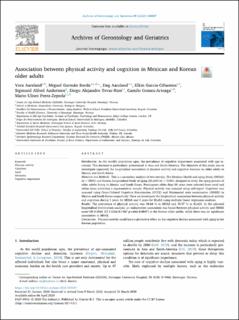| dc.contributor.author | Aarsland, Vera | |
| dc.contributor.author | Borda, Miguel Germán | |
| dc.contributor.author | Aarsland, Dag | |
| dc.contributor.author | Anderssen, Sigmund Alfred | |
| dc.date.accessioned | 2020-04-21T09:17:26Z | |
| dc.date.available | 2020-04-21T09:17:26Z | |
| dc.date.created | 2020-04-20T12:13:31Z | |
| dc.date.issued | 2020-04 | |
| dc.identifier.citation | Aarsland, V., Borda, M. G., Aarsland, D., Garcia-Cifuentes, E., Anderssen, S. A., Tovar-Rios, D. A., ... & Perez-Zepeda, M. U. (2020). Association between physical activity and cognition in Mexican and Korean older adults. Archives of gerontology and geriatrics, 89, 104047. | |
| dc.identifier.issn | 0167-4943 | |
| dc.identifier.uri | https://hdl.handle.net/11250/2651816 | |
| dc.description.abstract | Introduction: As the world's population ages, the prevalence of cognitive impairment associated with age in- creases. This increase is particularly pronounced in Asia and South-America. The objective of this study was to investigate separately the longitudinal association of physical activity and cognitive function in; older adults in Mexico and South Korea. Materials and Methods: This is a secondary analysis of two surveys, The Mexican Health and aging Study (MHAS) (n = 5853) and Korean Longitudinal Study of aging (KLoSA) (n = 5188), designed to study the aging process of older adults living in Mexico and South Korea. Participants older than 50 years were selected from rural and urban areas achieving a representative sample. Physical activity was assessed using self-report. Cognition was assessed using Cross-Cultural Cognitive Examination (CCCE) and Minimental state examination (MMSE) in Mexico and South Korea respectively. Here we investigate the longitudinal association between physical activity and cognition during 3 years for MHAS and 4 years for KLoSA using multiple linear regression analyses. Results: The prevalence of physical activity was 40.68 % in MHAS and 35.57 % in KLoSA. In the adjusted longitudinal multivariate analysis, an independent association was found between physical activity and MMSE score OR 0.0866 (CI 0.0266-0.1467 p-value 0.0047) in the Korean older adults, while there was no significant association in MHAS. Conclusions: Physical activity could have a protective effect on the cognitive decline associated with aging in the Korean population. | en_US |
| dc.language.iso | eng | en_US |
| dc.relation.uri | https://www.sciencedirect.com/science/article/pii/S0167494320300418 | |
| dc.rights | Navngivelse 4.0 Internasjonal | * |
| dc.rights.uri | http://creativecommons.org/licenses/by/4.0/deed.no | * |
| dc.subject | gerontologi | en_US |
| dc.subject | fysisk aktivitet | en_US |
| dc.subject | demens | en_US |
| dc.subject | aldring | en_US |
| dc.title | Association between physical activity and cognition in Mexican and Korean older adults | en_US |
| dc.type | Peer reviewed | en_US |
| dc.type | Journal article | en_US |
| dc.description.version | publishedVersion | en_US |
| dc.rights.holder | © 2020 The Author(s). | en_US |
| dc.subject.nsi | VDP::Medisinske Fag: 700 | en_US |
| dc.source.volume | 89 | en_US |
| dc.source.journal | Archives of gerontology and geriatrics | en_US |
| dc.identifier.doi | 10.1016/j.archger.2020.104047 | |
| dc.identifier.cristin | 1807117 | |
| cristin.ispublished | true | |
| cristin.fulltext | original | |
| cristin.qualitycode | 1 | |

